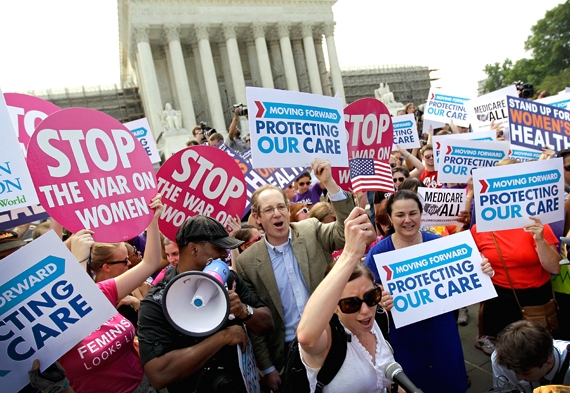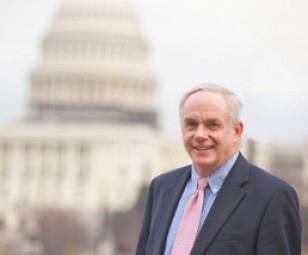
Supporters of President Barack Obama’s health care law celebrate outside the Supreme Court in Washington after the court’s ruling. Photo: AP
How Both Obama and Romney Could Benefit
Few people expected the legal battle over President Barack Obama’s health care law to play out like the way it did. Most of the experts predicted that a majority of the nine-member Supreme Court would strike down at least part of the sweeping reform law, with most betting that the so-called individual mandate provision would be deemed unconstitutional. That’s because the court generally leans to the right with five justices more often than not taking a conservative view of cases before the high court, while the remaining four are seen as the more liberal bloc.
The mandate in the health care law requires Americans to buy health insurance by 2014 or face a penalty levied by the federal government. Chief Justice John Roberts formed an unusual alliance with the high court’s four reliably liberal justices that led to a five-to-four decision to uphold the health care law, including the individual mandate. Roberts’ reasoning was that the government’s penalty scheme for those not buying insurance was similar to the government imposing a tax, like the one on cigarettes, and is therefore valid under the Constitution.

Prohibiting the denial of insurance coverage for pre-existing medical conditions is one of the law’s popular provisions. Photo: Thinkstock
The four conservative justices meanwhile wanted to strike down the entire health care law, even those provisions that have proven popular such as keeping young people on their parent’s health insurance until the age of 26 and blocking insurance companies from denying coverage based on pre-existing medical conditions beginning in 2014.
Roberts did join his conservative colleagues in rejecting one key argument made by the Obama administration — that Congress does have the power to require most Americans to buy health insurance. This part of the ruling could limit future attempts by Congress to regulate business activities under what is known as the ‘Commerce Clause’ of the Constitution. But after first siding with conservatives on this point, Roberts then proceeded to save the president’s signature law by forming his alliance with liberal justices to find that the individual mandate is constitutional as a tax on those who do not wish to buy insurance.
Political Impact
There’s something here for both sides. It’s an unexpected legal victory for the president and his Democratic supporters, many of whom were bracing for bad news from the high court and even the possibility that the entire law would be struck down. So on that score, the Obama campaign hopes the ruling will energize the president’s supporters in November. Obama supporters voted in record numbers in 2008 and the campaign has long feared that a drop-off in Democratic intensity could deny him a second term this year.
But the Supreme Court decision could also light a match under Republican supporters of Mitt Romney. Many conservatives felt betrayed by the high court ruling, expecting at the very least that the individual mandate would be thrown out and at most that the entire law would be struck down. Some of them are already directing their ire at Chief Justice John Roberts for his key role in fashioning a narrow majority on the court that saved the health care law. Anger can be a powerful force in politics since strategists always like to say that it’s easier to get people to go out and vote against something than for it.
The ruling has sparked renewed intensity among Tea Party supporters, and House Republicans are already plowing ahead with a plan for yet another vote to repeal the health care law on July 11th. They have already voted 30 times to repeal either the full law or parts of it, only to have the Democratic-controlled Senate block them each time. Republicans know that repealing the law is a longshot this year but they hope to force as many Democrats as possible to vote for the law in both the House and Senate and then use those votes against them with negative ads in advance of the November election.
Tea Party supporters came out in force in 2010 and helped Republicans win back the House of Representatives and make gains in the Senate, but there was concern among some party activists this year whether they could match those turnout and intensity levels. The health care ruling could help the Republicans get those activists to turn out in November.
So yes, this is good political news for the president to an extent, but it will probably also fire up that conservative base even more since they now know that no court will save them from “Obamacare” and that the only way to undo the health care legislation is to turn the president out of office in November and elect more Republicans to Congress to help kill it.
It could complicate things for Mitt Romney, though. Romney was the author of the individual mandate provision in the Massachusetts health care law passed when he was governor, so that could continue to be part of the discussion if the health care issue is re-debated in this campaign. Secondly, Romney wants to focus almost exclusively on the economy and make the argument that Obama had his chance to fix things but failed. Shifting the debate to issues like health care and immigration takes him off target and could cost him in November.
Impact on the Roberts Court
This is clearly one of the most important Supreme Court rulings since the 2000 case that ended the squabble over the presidential election that year between Republican George W. Bush and Democrat Al Gore. That ruling went in Bush’s favor, but public opinion polls showed that the court’s reputation was damaged because many people thought it was becoming too politically driven.

Chief Justice John Roberts has vowed he will decide cases on legal, not ideological, grounds. Photo: AP
John Roberts was well aware of that criticism when he was nominated to the high court by President Bush in 2005. During his Senate confirmation hearings Roberts insisted that he was not an ideologue and that he would decide cases on pragmatic legal grounds, not political arguments. Roberts also indicated he would not be aggressive in looking for reasons to overturn acts of Congress, and all of these factors seem to be present in the health care decision.
By first agreeing with conservatives on the court that Congress overstepped its bounds by adding the health insurance mandate, Roberts pleased those who see the health care law as a classic overreach by the federal government. But then, by joining the liberal justices in saving the law by arguing that the mandate could be construed as a tax, he seemed to pull the court back from the brink of overturning a law passed by Congress, no matter how flawed that process may have been politically.
So it looks as though the Roberts era has now begun on the court. One way to look at it is as a philosophy of limits, of trying to balance the power of the central government, the power of the states and the power of the courts to rein in Congress and the Executive Branch when conflicts arise.


2 responses to “Supreme Intervention Saves Health Care Law”
Dear Mr. Malone,
Hi! Thank you for a very interesting item.
While health care is important, I can only wonder at the justices’ grasp of the Constitution of the United States of America.
“Obamacare” is a clear violation of ARTICLE ONE, Section Nine, Clause 4 of the original Constitution as well as ARTICLE TEN of the Articles in Addition to and Amendment of the Constitution.
Please keep in mind that I am not commenting on the merits of “Obamacare,” only on its constitutionality. Thank you.
Semper Fidelis,
Thomas
Thank you for sharing excellent informations. Your web site is so cool. I’m impressed by the details that you have on this blog. It reveals how nicely you perceive this subject. Bookmarked this website page, will come back for more articles. You, my friend, ROCK! I found just the information I already searched all over the place and just couldn’t come across. What a perfect web-site.